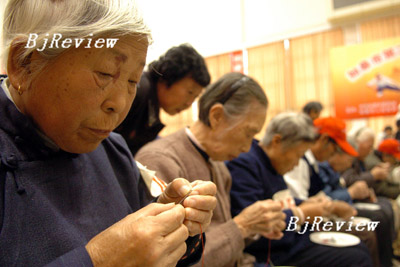
"Hey, little buddy, will you support me when I'm getting old?" Han Wenshan, 35, asked his newborn baby as he picked him up at home.
The Chinese tradition of raising sons to support parents in their old age has been diluted by the rapidly growing economy and improving standard of living. As is the case with developed countries, China faces an aging society. People are living longer and having fewer children. Therefore many Chinese families are falling into a 4-2-1 family pattern: a couple raises one child and supports four elderly parents. But few realize that a problem looms ahead.
The aging of the population is a trend that now affects a growing number of countries. Not long ago, the Information Office of the State Council, China's cabinet, issued a white paper on measures China is taking to help its elderly population. The paper said China's population entered the aging phase at the end of the 20th century as the proportion of people aged 60 and above accounted for over 10 percent of the entire population. By the end of 2005, China had nearly 144 million people over 60, accounting for 11 percent of the population, according to the white paper.
An expanding aged population inevitably means that many issues must be addressed, as the problem concerns every aspect of society. It puts more pressure on each family, causing disturbing economic consequences and serious social problems. It also challenges the labor force supply and the pension system.
"I used to think that it's not an issue for me to provide for the aged," said Han, whose parents and parents-in-law all enjoy pensions and medical insurance. But last year Han's father suffered a serious illness and afterward Han began to feel the pressure on his shoulders.
"It was a difficult time for me," Han said, adding that the medical expense was over 100,000 yuan and his father's medical insurance was completely inadequate, as was the pension. "Our savings almost all went for the medical expense," said Han, who works for a private company and considered himself fairly well-off.
After his father recovered, Han opened bank accounts for each parent and deposited some money into the account every month to prepare for future uncertainties. In addition, he has to save money every month to provide for his son's future education. "I'm now breaking my back working to support my family: saving pensions for the parents, my son's education funds, the mortgage, living costs."
Han also bought some commercial old-age insurance for himself. "We have to take precautions before it is too late, and many of my colleagues share the same view," he said.
Preparation is lacking
China is still not prepared to face the aging society issue, psychologically or materially, some experts say. Government officials and scholars are discussing the issue, however, and working to come up with a solution. But there are no quick steps.
Some experts suggest increasing the retirement age from the current 55 for women and 60 for men by some five years. Though the pressure on the pension system could be eased a bit, others argue that this would make it harder for young people to find jobs.
There's also the suggestion that the family planning policy should be loosened but opponents say this would only result in more births in rural areas, but will not affect the situation in the cities. According to Ren Yuan, associate professor in the Institute of Population Research (IPR) at Fudan University, more births will affect the demographics of aging, but it won't reduce the absolute number of the aged.
Another obstacle is that the financial means to deal with the problem are somewhat limited since China is still a developing country. "When the Western countries became aging societies, their per capita income was triple that of the Chinese level," said He Ping, Director of the Social Insurance Research Institute of the Ministry of Labor and Social Security.
| 